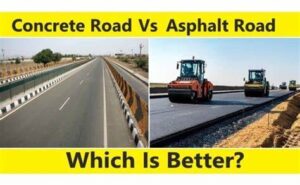
Which Are Better Roads for Your Project — RCC or Asphalt?
General Introduction
When it comes to choosing the right road construction material for your project, there are so many factors to consider, such as durability, cost, maintenance requirements, and performance characteristics. Two of the most common road materials are RCC (roller-compacted concrete) and asphalt. Roller-compacted concrete and asphalt both have their advantages and disadvantages, and the choice between the two will depend on several factors specific to your project. In this blog, we will explore the differences between RCC and asphalt and the factors to consider when making a decision on which material to use for your project.
RCC vs. Asphalt Roads: The Major Differences
RCC (Roller Compacted Concrete) roads and asphalt roads are both commonly used for paving, but they differ in their composition, construction process, performance characteristics, and cost. Let us see the major differences between the two materials and the factors affecting the choice of material for road construction.

Composition:
RCC roads are made of a mixture of cement, aggregates, and water, with a lower water-cement ratio than traditional concrete. The mixture is compacted with a roller to create a smooth, durable surface.
Asphalt roads are made of a mixture of asphalt binder, aggregates, and sand, which are heated and mixed together before being applied to the road surface.
Construction process:
RCC roads are constructed using a paver that spreads the mixture evenly across the road surface. The mixture is then compacted with a roller to create a smooth, level surface. The process of construction here is more time-consuming than that of laying asphalt pavement.
Asphalt roads are constructed using an asphalt paver that applies the mixture in layers. The layers are compacted using a roller to create a smooth, even surface. Asphalt roads are built at a quicker pace as its process is less complex than the construction of RCC roads.
Performance characteristics:
RCC roads are more durable and can withstand heavier loads than asphalt roads. They are also less prone to rutting, cracking, and other forms of damage.
Asphalt roads are more flexible and can better accommodate changes in temperature and ground movement. They also have good drainage properties, which make them suitable for areas with high rainfall.
Cost:
RCC roads are relatively more expensive than asphalt roads due to the materials used for construction. Also, the maintenance and repairs of RCC roads are much higher than those of asphalt roads.
Asphalt roads are cost-effective mainly due to the raw materials and the construction methodology used for them. Hence, these are preferred more due to their cost factor. The RCC roads can sometimes hinder the overall budget of the project.
Wrapping Up – “Which roads are better for your project: RCC or asphalt?”
In conclusion, when it comes to choosing between roller-compacted concrete and asphalt for your road construction project, there are many factors to consider. Roller Compacted Concrete roads have a high load-bearing capacity and are durable, making them suitable for heavy-duty applications such as airports, ports, and industrial areas. They also require minimal maintenance and have a long lifespan, making them a cost-effective choice in the long run.
Asphalt roads, on the other hand, are less expensive to construct and can be installed quickly, making them ideal for projects with tight budgets and deadlines. They also have good skid resistance and are quieter than RCC roads, making them a better choice for areas with high traffic volumes.
Ultimately, the choice between RCC and asphalt will depend on the specific needs and requirements of your project. It is important to consider factors such as load-bearing capacity, maintenance requirements, durability, cost, and performance characteristics. Working with experienced engineers and contractors can help you make an informed decision and ensure the success of your road construction project.
Regardless of the material chosen, it is important to ensure that the road is constructed to the highest standards to ensure safety and longevity. Regular maintenance and repairs are also critical to extending the lifespan of the road and avoiding costly repairs down the line. By carefully considering the factors outlined in this article, you can make an informed decision and ensure the success of your road construction project.




